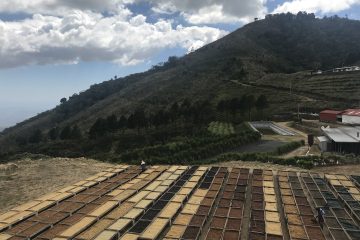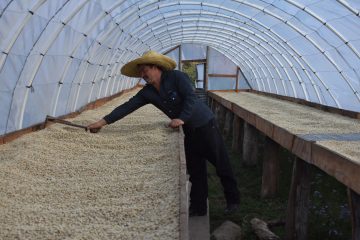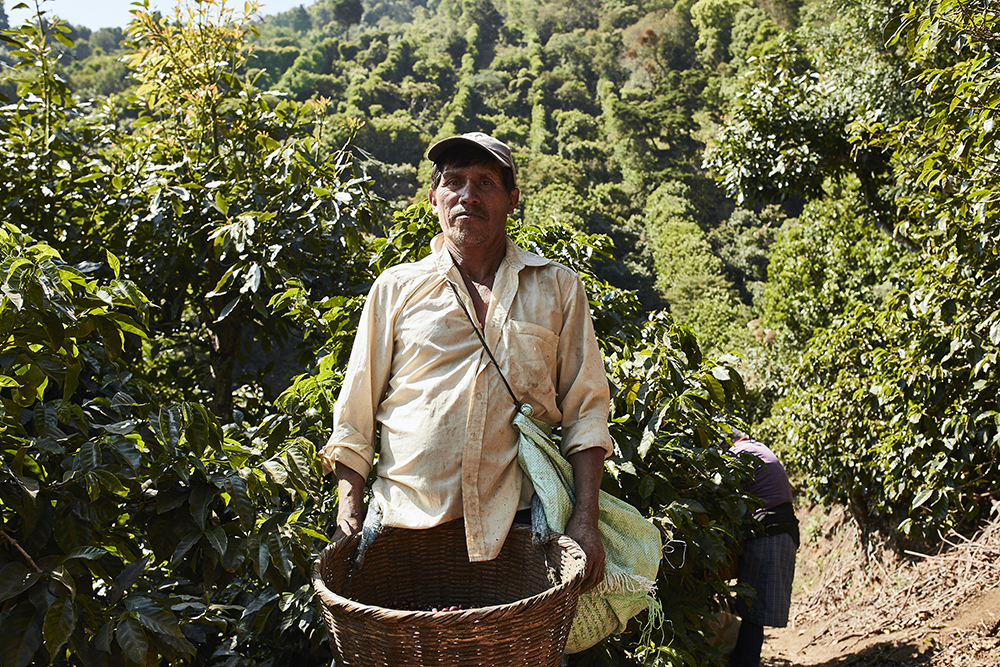The first El Salvadors from Las Cruces are shipped and on the way. Los Pirineos just ended the harvest and we are currently making our selection. Quality this year looks great. Compared to last year’s cupping, at this stage the coffees seems to be more intense and fruit driven, with a lot of structure and body to it. We spent days in different periods both in the fields and at the cupping table and we have high hopes for both quality and new interesting profiles. We will as always buy a big range of different types of washed & soaked coffee and “white honey” coffee, but will also increase the amount of full honeys and naturals.
Besides being a great Central American coffee, the El Salvadorian coffee we are buying is some of the most consistent, reliable, solid and and versatile coffees we are carrying. This is a result of many years of cooperation with producers interested in developing their products and adapt to requirements from us and our clients that are often forefronting quality coffee in Europe.
Las Cruces
 Andres and Jose Antonio with their dad
Andres and Jose Antonio with their dad
The brothers Andres and Jose Antonio took over the operations from their father some years ago. Jose Antonio manages the fields and the agronomical part, and Andres is managing the different processes at the mill. It’s always inspiring to spend time with them at the farms and the mill, and always a lot to learn. They have so many interesting projects right now that involves replanting old blocks in the highest altitudes, experimenting with new cultivars, pruning techniques etc. As we have worked with them for so long I feel they give great priority to us. If there are new farms I want to buy from we can plan ahead of the season what farms we should do with different processing. Every year they try to develop new products, they are investing in shade drying, and are reconstructing their mill to meet our requests.
 Our kenya SL28 trees at El Martillo are starting to grow up, they were ruling the blind cupping.
Our kenya SL28 trees at El Martillo are starting to grow up, they were ruling the blind cupping.
We have also cooperated on planting new cultivars, like SL 28 from Kenya among others, and we have the priority on these. We did a blind cupping with them now with cultivars from their experimental plots. There were Geishas, Ethiopians, different bourbons, Kenyans and many other new and old cultivars. The Kenyan SL28 was definitely the standout.
The last years they have worked a lot on Honey and Natural processing. We do buy way more different processes from them now than before, but washed/white honey still counts for the majority of our Las Cruces selection. We are also pre-contracting volumes with them on a three years basis, so they can budget and finance production and innovation, and we are at the same time securing our supply.
Los Pirineos
 Gilberto in his nursery. A lot of cultivars for his seed bank.
Gilberto in his nursery. A lot of cultivars for his seed bank.
Los Pirineos is a farm in another region called Usulatan. The altitudes are slightly lower than Santa Ana, but the climate is different and cooler. The owner Gilberto Baraona is always doing something new on the farm. The development never stops and if he is not building new drying tables etc, he is replanting the farm with different cultivars or constructing a new dry mill. Last year he built an insane amount of drying beds. Besides his washed white honeys and washed and soaked coffees, he is now doing a lot of full honey coffees and naturals. He is currently replanting big parts of his farm with new and different cultivars. We were just there, and there is a lot of new Pacamara planted in the medium altitudes that will start producing coffees in two years time.
He is doing drying both in shade and in sun. We generally buy washed bourbons and pacamaras from him, all dried on tables both in shade and sun. Here as well we are trying to increase the diversity with different processed coffees. Coffees from his higher altitudes always come in later, and many of them are not yet harvested. Gilberto is also processing coffees from some of his neighbors that have been really good the last few years. He has also invested in a fully operational dry mill at his farm, meaning he can do coffees more or less end to end and control the whole supply chain.
We are expecting the first Las Cruces coffee to arrive in May and Los Pirineos in June. You will have an opportunity to cup them at our upcoming event in Oslo in April.








